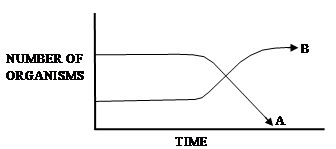Population Interactions
Population Interactions: Overview
This Topic covers sub-topics such as Parasitism, Commensalism, Mutualism, Predation, Ectoparasite, Brood Parasitism, Endoparasite, Parasitoid, Hyperparasitism, Population Interactions, Positive Interactions and, Negative Interactions
Important Questions on Population Interactions
Certain species of wasps are seen to frequently visit flowering fig trees. The interaction between them is:
The egrets always forage close to where the cattle are grazing. The interaction between them can be called:
Which of the following interactions play a key role in keeping an eye on the number of the population?
Find the correct match of the organisms with the interaction they exhibit:
(a) Cuscuta growing on a shoe flower plant i)Brood Parasitism
(b) Mycorrhizae living on the roots higher plants. ii)Commensalism
(c) Clownfish living among the tentacles of a sea anemone. iii)Mutualism
(d) Koel laying her eggs in the crow’s nest. iv)Parasitism
Obligate parasites live on
The graph below shows the changes in two populations of herbivores in a grassy field. A possible reason for these changes is that

Which one of the following is a matching pair of certain organism(s) and the kind of association between them?
The symbiotic relationship of algae and fungus is found in
Match the following pairs of interacting species to the corresponding names of interaction:
| Name of interacting species | Name of Interaction | ||
| i | Herbivore and Plants | a | Mutualism |
| ii | Cuckoo and Crow | b | Predation |
| iii | Sea anemone and Clown fish | c | Parasitism |
| iv | Fungus and Cyanobacteria (Lichen) | d | Commensalism |
Match List I with List II:
|
List I (Interacting species) |
List II (Name of Interaction) |
| A. A Leopard and a Lion in a forest/grassland | I. Competition |
| B. A Cuckoo laying egg in a Crow's nest | II. Brood parasitism |
| C. Fungi and root of a higher plant in Mycorrhizae | III. Mutualism |
| D. A cattle egret and a Cattle in a field | IV. Commensalism |
Choose the correct answer from the options given below:
Match List I with List II:
|
List I (Interaction) |
List II (Species A and B) |
| A. Mutualism | I. +(A), 0(B) |
| B. Commensalism | II. -(A), 0(B) |
| C. Amensalism | III. +(A), -(B) |
| D. Parasitism | IV. +(A), +(B) |
Choose the correct answer from the options given below:
If '+' sign is assigned to beneficial interaction, '-' sign to detrimental and '0' sign to neutral interactions, then how many of the following is/are representing '+' and '-' interaction?
A. Orchid growing on a mango branch.
B. Sea anemone and clown fish.
C. Lichens.
D. Sparrow eating any seed.
E. Cuscuta on hedge plant.
Cuscuta is an example of
Match the columns and find out the correct combination:
| Column I | Column II | ||
| A | Predation | 1 | Cuscuta and hedge plant |
| B | Commensalism | 2 | Balanus and Chathamalus |
| C | Parasitism | 3 | Cactus and moth |
| D | Competition | 4 | Orchid and mango |
Mention examples of ectoparasites on some fishes.
Which of the following interspecific interaction is represented by ?
In an interaction among species A and species B, species A can show camouflage, chemical or morphological defence against species B. Species A is most likely to be:
